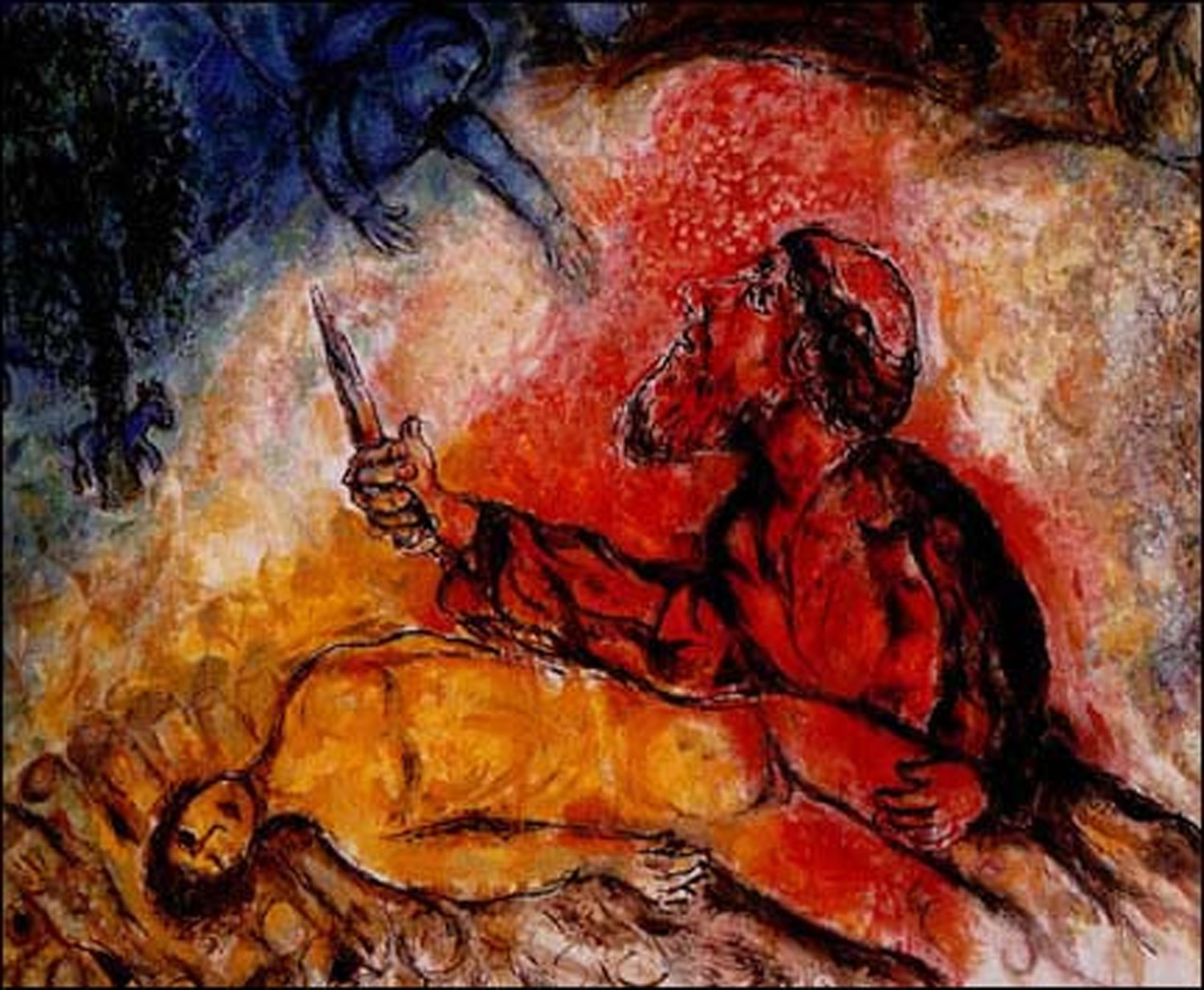(My sermon on Genesis 22:1-22, Romans 6:12-23, and Matthew 10:40-42 – delivered at St. Thomas’ Episcopal Church on June 29, 2014)
Back when I was in seminary and, like my fellow students, full of indignation at a world teeming with injustice and inequity – way back when the consequences of fighting every battle that crossed my path seemed unimportant in the face of so many urgent causes – a very wise professor said these words to me: “You must choose the hill you die on.”
The obvious implication of these words is that not every battle is worth fighting tooth and nail, and that fighting every skirmish will diminish your strength so much that when the real battle comes you won’t have the will or the energy to fight.
But the underside of his advice is the truth that all of us are called to die on a hill someday – called to sacrifice some piece of who we are for that which we believe, for an ideal greater than ourselves. The sticking point is that we choose the hill.
As a whole, our society has a love affair with sacrifice. Heroes, like policemen, firefighters, soldiers, sacrifice their lives for those who cannot protect themselves. Movies and television idolize characters who give their lives and more to save the earth, save the galaxy, save the universe: Star Trek, Hunger Games, Lord of the Rings, Saving Private Ryan, 300, Star Wars, Titanic, 24, Doctor Who, Game of Thrones, Walking Dead. Classic western literature is no exception: Les Miserables, A Tale of Two Cities, Morte d’Artur, Little Women, Charlotte’s Web. And our scriptures are no exception, in particular the central story of our faith, the one we sing every week during Eucharist: the sacrificial death of the Son of God, whose blood absolves the world.
However, today’s story of sacrifice isn’t heroic. It isn’t even self-sacrifice. It’s the sacrifice of another, of a beloved child, all at the request a seemingly capricious God, all for the purpose of testing just how far God’s servant will go if asked.
It’s not like Abraham has proven himself unfaithful. Yes, he did deceive the Philistine king Abimilech letting him take Sarah, Abraham’s wife, for to be one of Abimilech’s wives – just to save his own hide. And there was that business with Abraham taking Sarah’s slave, Hagar, to bear children in Sarah’s name, rather than trust God’s promise of a heir by Sarah. Abraham had self-preservation issues, but in a desert land filled with enemies on all sides, where self-preservation was built into every part of life, it’s understandable.
On the flip side, Abraham had proven himself, over and over again, to this God, leaving his people for an unknown land, in a dangerous place, with a barren wife, and a tribe of followers depending on him, all because he heard a God give him a somewhat elusive promise that he would be the father of a great nation. It was a lot to ask of anyone, and Abraham, for the most part, came through.
However, at the beginning of this story, Abraham is in a bit of a leadership crisis. He sent away his son by Hagar, Ishmael, is oldest son and arguable his heir becaue by law Ishmael belonged to Sarah. He does this at Sarah’s urging because she wanted Isaac to be the heir. He listens to his wife which was not a sign of strong leadership in these ancient times. And in sending away one of his heirs and a child-bearing female, he weakens his tribe.
Soon after, Philistines breakaways take control of Abraham’s well, a move that could have started a war. Water was much more precious than gold in a desert land. Abraham does not take the well back by force, but negotiates a payment for his own well to the King Abimilech, the same king he tricked a couple of chapters before with Sarah. It was a shrewd move to protect a tribe of shepherds from an army, but it reinforced his weakness in the Philistine territory. All it would take was the winds of favor to shift, and the Philistine army could swoop in and take the well, the servants, his flocks, and anything else they wanted. Abraham and his tribe were in a precarious situation.
Which brings us to Isaac and hill to climb. While our modern sensibilities are horrified at the idea of child sacrifice, this was not the case in these ancient times. For thousands of years, the ancient world sacrificed children to please their gods. Leaders especially were asked to make these sacrifices in difficult times to ensure the favor of the gods by offering the most precious, most valuable offering the people could give – the heir, the first son, the one of promise. Abraham lived hundreds of years before Moses received the law of God prohibiting child sacrifice. All around Abraham, tribes offered adults and children to their gods, to ensure good crops, victory, and survival. They believed the gods could be swayed by such devotion.
It is a hideous god indeed who would ask this of anyone. And the sticky wicket of our passage is that our God does.
Before we try to explain away God’s actions with heresies such as differentiating the Old Testament God from the New Testament God, let me say, with much discomfort, that this is indeed the same God we worship. The God of Abraham, Isaac, and Jacob is the same God of Jesus, Paul, and John. It is the same God who saves Hagar and Ishmael, but allows his own son to die on the hill of Gethsemene – the hill he chooses. This God asks the same of Abraham.
It doesn’t make us feel better knowing from the get-go that this monstrous request of a parent to sacrifice their child is a test, a trial, a proving of Abraham by a God who is supposed to love him.
As a whole, we are a people who value fairness. And this is in no way fair. In this day and age, we expect to know when a test is coming and we expect to be told what we need to know so we can prepare for the test. After all, it’s only fair to prepare people what they must prove, so they can do their best. Not to do so is a set-up for failure. We also believe testing a loved-one regarding their faithfulness to you is downright manipulative, untrustworthy, and desperate.
No where in our scriptures does it say that life is fair. Particularly in Abraham’s time when so much rode on instincts for survival. Shrewdness beat out fairness, strength was more highly valued than kindness, power was everything. And while we would like to believe we are so much more evolved than this, there is an argument to be made that we are not. Power still rules the day, and those without power don’t tend to use fairness and kindness to obtain it.
So here we have a God who is testing Abraham by asking him to sacrifice his son, his only son – remember Ishmael is gone; to sacrifice the son he loves – for Ishmael was not loved as much as Isaac; to sacrifice his son – the one named Isaac, the one named “laughter,” for that’s what Isaac means. He was the child of the promise – of promises fulfilled and yet to be fulfilled. God asks Abraham to take this son and give him as a burnt offering on a hill yet to be seen – the hill Isaac, and the laughter and the hope of Abraham, will die on.
Given what we know about leaders and child sacrifice, Abraham doesn’t even question the command. Funny – he questioned God over the destruction of Sodom and Gomorrah. He shames God for deciding to destroy the cities. Yet Abraham does not do this for his own son, the one he loves, Isaac, child of laughter. Even when he puts the wood for the fire on Isaac’s back and they walk together up the hill where Isaac will surely die, even when Isaac poignantly asks where the lamb is for the sacrifice, even when he lays his own son on the wood and raises the knife to slay him – Abraham utters not a word in protest to the God who demands an unholy sacrifice. It’s as if he expected it.
It’s a game of chicken, a triple-dog-dare, and Abraham, leader in a difficult situation, is willing to go through with it.
Thankfully, God is not.
God loses the game – he speaks first and Abraham stops and listens.
I believe this was the real test: that in the face of a threat to his power, in desperation to find some security in a treacherous world, in blind obedience to a God who already sent away one son and asks for the sacrifice of the other, Abraham stops and listens.
He was moments away from going through with it. His tribe would have been grateful for the sacrifice because everyone else was doing it, his position as leader would have been secured because he offered a favorable sacrifice, he had already gone this far – but he stopped and listened. Only then did he see the ram in the thicket, only then did he find that God did provide an way out, God provided an escape even from God.
And God saw a man willing to destroy his hopes and dreams, his flesh and blood, by the mere utterance of a word, faithful to a fault – but a man willing to step away, even if it meant going in a completely different direction. This was the man on whom God placed all the hopes and dreams for the people of Israel, and while God’s test was a vile, disturbing and inexcusable thing to ask of anyone, God realized that he chose this man well.
The thing about sacrifice is that we will all be called to make one, especially if we follow God’s call to fulfill the promise of our lives. The question is whether we will offer up the conventional sacrifice for a little more power and security.
People on the margins of our society are sacrificed every day for company profits, market share, and global presence. Poverty still exists today because no one is willing to give up the illusion of security just enough so all of us have enough to eat. Our children die in the streets every day as a result of powerful factions fighting over land, over oil, yes – over water. The countries on this earth, including our own, allow for the “collateral damage” of our environment, they give up our young men & women, our sick, our lame, our immigrants, our future to be sacrificed for a stronger place on the international stage. The powerful are still willing to sacrifice the those without a voice, so that the greater good of a few will prevail.
In our story, Isaac has a voice. He speaks for those who would have their lives taken in order to control that which is beyond our control. “Where is the lamb?” he asks, just before he discovers that he is the lamb, just before his father raises a knife to please a capricious God, just before the same God saves him.
God becomes something different to Abraham and Isaac that day – instead of being God the Arbitrary & Unreasonable, God becomes Jehovah Jirah – The God Who Sees and Provides.
God’s voice is still crying to our leaders to stop and listen, to see that all is provided if they will just look up from the sacrifice they think they must make, change direction, and see a world of possibility.
It would be so easy to end the sermon here.
But these stories are never about someone else, somewhere else, comfortably far away where we can judge them and then get on with our lives.
These stories are always about us.
This story is about when we feel threatened, when what we’ve worked so hard for is taken by someone else and everything we value is collapsing right in front of us, when we are asked to sacrifice something because it’s what’s expected of us.
What lies on that altar that we believe we must give up in order to maintain a bit of control in a world that spins out of control every day? What do we give up so we can prove how worthy we are – our integrity, our honesty, our faith? Who have we trampled, ignored, put aside, released to get to where we want to be only to find it wasn’t all that we had hoped?
The best of intentions, working for a greater good, maintaining the peace are not the voice of God whispering in in our ear if it involves crushing someone to obtain it.
All of us who are Christians are called to love a world that tends to crucify the ones who dare to love it. We are called to a hill, where we pick up a cross and follow the one who showed us how to be a living sacrifice in a world of desperate need. Which hill we die on is our own choice. Choose wisely. Stop often and listen carefully. God just may provide a way out or show you another hill.
The power is in our own sacrifice, our self-sacrifice – not the sacrifice of another.
The paradox of that sacrificial power is this: the first shall be last and the last shall be first, those who will lose their life for the sake of loving this world will save it.
Our power isn’t in our strength but in our vulnerability. Our power is not in standing alone against the world, but is in each other standing hand in hand and in knowing that we have with us the God who Sees and Provides. Our power is right here [indicates hands] – in hands that heal and comfort and help and build bridges where none existed before. Our power is not in proving ourselves to the powers that rule this world or eliminating every threat so we can feel a little safer – it is in the hope that one day every small act of kindness, even a cold cup of water for a thirsty stranger, will be enough to change the world.
Amen.



Beautiful and well done..
Thank you for a provoking sermon!
[…] a (euphemism alert) risky way – Abram’s attempted sacrifice of Isaac [an interesting blog post here] is not a model for parenthood easily […]